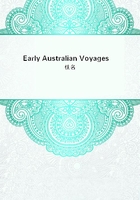
第30章
In the first place, then, it is most evident, from Captain Tasman's voyage, that New Guinea, Carpentaria, New Holland, Antony van Diemen's Land, and the countries discovered by De Quiros, make all one continent, from which New Zealand seems to be separated by a strait; and, perhaps, is part of another continent, answering to Africa, as this, of which we are now speaking, plainly does to America. This continent reaches from the equinoctial to 44 degrees of south latitude, and extends from 122 degrees to 188 degrees of longitude, making indeed a very large country, but nothing like what De Quiros imagined; which shows how dangerous a thing it is to trust too much to conjecture in such points as these. It is, secondly, observable, that as New Guinea, Carpentaria, and New Holland, had been already pretty well examined, Captain Tasman fell directly to the south of these; so that his first discovery was Van Diemen's Land, the most southern part of the continent on this side the globe, and then passing round by New Zealand, he plainly discovered the opposite side of that country towards America, though he visited the islands only, and never fell in again with the continent till he arrived on the coast of New Britain, which he mistook for that of New Guinea, as he very well might; that country having never been suspected to be an island, till Dampier discovered it to be such in the beginning of the present century. Thirdly, by this survey, these countries are for ever marked out, so long as the map or memory of this voyage, shall remain. The Dutch East India Company have it always in their power to direct settlements, or new discoveries, either in New Guinea, from the Moluccas, or in New Holland, from Batavia directly. The prudence shown in the conduct of this affair deserves the highest praise. To have attempted heretofore, or even now, the establishing colonies in those countries, would be impolitic, because it would be grasping more than the East India Company, or than even the republic of Holland, could manage; for, in the first place, to reduce a continent between three and four thousand miles broad is a prodigious undertaking, and to settle it by degrees would be to open to all the world the importance of that country which, for anything we can tell, may be much superior to any country yet known: the only choice, therefore, that the Dutch had left, was to reserve this mighty discovery till the season arrived, in which they should be either obliged by necessity or invited by occasion to make use of it; but though this country be reserved, it is no longer either unknown or neglected by the Dutch, which is a point of very great consequence. To the other nations of Europe, the southern continent is a chimera, a thing in the clouds, or at least a country about which there are a thousand doubts and suspicions, so that to talk of discovering or settling it must be regarded as an idle and empty project: but, with respect to them, it is a thing perfectly well known; its extent, its boundaries, its situation, the genius of its several nations, and the commodities of which they are possessed, are absolutely within their cognisance, so that they are at liberty to take such measures as appear to them best, for securing the eventual possession of this country, whenever they think fit. This account explains at once all the mysteries which the best writers upon this subject have found in the Dutch proceedings. It shows why they have been at so much pains to obtain a clear and distinct survey of these distant countries; why they have hitherto forborne settling, and why they take so much pains to prevent other nations from coming at a distinct knowledge of them: and I may add to this another particular, which is that it accounts for their permitting the natives of Amboyna, who are their subjects, to carry on a trade to New Guinea, and the adjacent countries, since, by this very method, it is apparent that they gain daily fresh intelligence as to the product and commodities of those countries. Having thus explained the consequence of Captain Tasman's voyage, and thereby fully justified my giving it a place in this part of my work, I am now at liberty to pursue the reflections with which I promised to close this section, and the history of circumnavigators, and in doing which, I shall endeavour to make the reader sensible of the advantages that arise from publishing these voyages in their proper order, so as to show what is, and what is yet to be discovered of the globe on which we live.